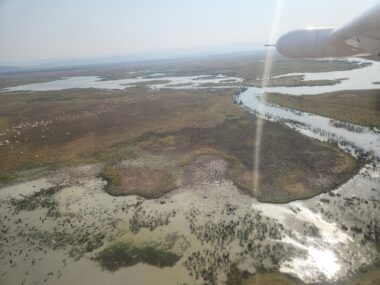Australia’s national science agency, CSIRO, and the Bureau of Meteorology are predicting more extreme heat events, longer fire seasons, more intense heavy rainfall, and sea level rise in the State of the Climate Report 2024, released today.
Available to comment:
Associate Professor Angie Bone, Planetary Health specialist and Co-Director of Monash Sustainable Development Institute (MSDI)
Contact: +61 456 428 906 or [email protected]
- Planetary health
- Health sector resilience and sustainability
- Climate adaptation and sustainable development
Comments attributable to Associate Professor Bone:
“Unless we urgently take decisive action, climate change will have bigger impacts on people's health than those we saw with COVID-19. Some parts of our community have already experienced the disastrous physical and mental health impacts of recent extreme events here in Australia, and the State of the Climate Report shows these events are going to be more frequent and more intense. Climate change affects every aspect of our health and wellbeing, and it is the most vulnerable in our community who feel it the most.
“In terms of direct impacts, heat, smoke, floods and storms can lead to immediate and wide-ranging health complications, but in the longer-term, there are the slower burn issues of the degradation of our air, water, land, and what that means for safe drinking water and sanitation, food security and safety and access to healthcare – particularly in lower income countries whose systems are already fragile.
“As world leaders prepare to meet at the UNFCCC COP annual climate summit in November, their decisions need to consider the costs of inaction on peoples’ health. We saw the extreme challenges of a lack of preparedness to public health crises just a few years ago during the pandemic, so let’s learn from that and avoid repeating the same mistakes.”
Available to comment:
Kylie Turner, Systems Lead - Sustainable Economies at Monash’s Climateworks Centre
Contact: +61 409 102 063 or [email protected]
- Sustainable pathways towards net zero
- Collaborative relationships and alignment to facilitate transformation
- Green economic transformation
Comments attributable to Turner:
“Reaching for the 1.5C target, which we know is challenging but possible, is the best path for Australia to both avoid the worst impacts of climate change, and make the most of our economic opportunity as the globe decarbonises. There is not a moment to waste.
“Our recent analysis shows aggregated state and territory climate targets are broadly aligned with limiting warming to well-below 2C of warming, but greater ambition is needed between 2027 and 2032.
“The analysis reveals the federal government’s 2030 target is within reach though this is provided state and territory governments deliver on their commitments and are actively working towards implementing them.
“The State of the Climate report shows how critical planned and future climate action is in reaching the goals of the Paris Agreement.”
Available to comment:
Associate Professor Zerina Lokmic-Tomkins, Monash School of Nursing and Midwifery, Registered Nurse, Advocate for Climate Change Mitigation and Adaptation to protect planetary health, Research Lead for Climate Change and Sustainable Healthcare.
Contact: + 61 3 9903 4840 or [email protected]
Read more of Associate Professor Tomkins’ commentary at Monash Lens
- Health impacts of climate change
- Heart health
- Maternal and child health
The following can be attributed to Associate Professor Lokmic-Tomkins:
“As a healthcare professional, I feel deep grief over the climate crisis, even though the CSIRO's State of the Climate 2024 report outcome was anticipated given the persistent lack of leadership and action to curb fossil fuel extraction, export and use. People must recognise that the environmental harm outlined in the report is closely linked to human health.
“The loss of marine ecosystems jeopardises food security and the livelihoods of those dependent on fishing. Rising sea levels are causing water salination, which undermines both water security and agricultural productivity. Reduced rainfall is intensifying droughts, further threatening farming and water supplies. These cascading effects harm both physical and mental health and disrupt essential health services. We must look beyond ‘net-zero’ goals and urgently support communities in adapting to uncertain climate futures. Building climate resilience in our healthcare systems—and particularly in our healthcare workforce, already exhausted from the COVID-19 pandemic—is now essential.
“Until today’s report, I was deeply hopeful that we can reduce global emissions to prevent further harm to human and planetary health. After today, I am very worried about the health of future generations as we know that extreme heat poses heightened health risks for pregnant women and babies, increasing the risk of pregnancy complications, preterm birth, low birthweight and stillbirth.
“For children, these impacts begin in the womb and may affect them throughout their lives, influencing both body and brain development. Threats to food and water security further compound these risks, as nutrition is essential to healthy pregnancies and the growth of babies and children. Australia must do much more and act much more urgently to strengthen global and local efforts to reduce emissions, not only to protect human health, but to safeguard all life on our planet.”
For more Monash media stories visit our news & events site: monash.edu/news
For any other topics on which you may be seeking expert comment, contact the Monash University Media Unit on +61 3 9903 4840 or [email protected]


